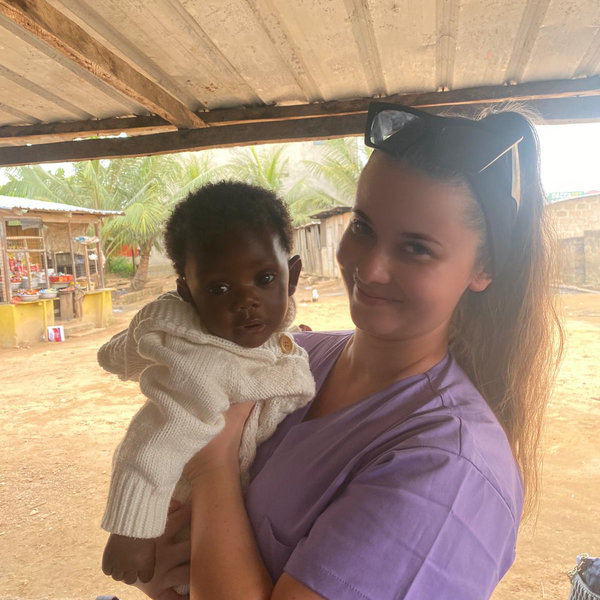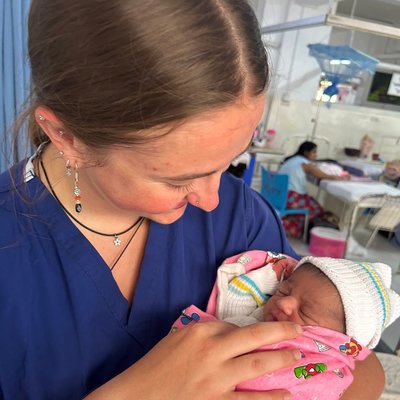Anglia Ruskin University 2019
 Dar es Salaam, Tanzania is like a neighbour to my country Uganda where l was born. When Work the World came to our university and presented the different destinations available I was very excited to see Tanzania was among them. I saw this as an opportunity for me to explore the country and learn more Swahili having been taught a few words of the language as a young child whilst attending school in Uganda.
Dar es Salaam, Tanzania is like a neighbour to my country Uganda where l was born. When Work the World came to our university and presented the different destinations available I was very excited to see Tanzania was among them. I saw this as an opportunity for me to explore the country and learn more Swahili having been taught a few words of the language as a young child whilst attending school in Uganda.
As an adult nurse, I chose to undertake two weeks in paediatrics and two weeks in the obstetrics and gynaecology department to gain an insight into different areas of nursing.
During my city orientation we boarded dala dalas (local transportation) to the hospital, it was tremendously hot and overcrowded. We (another student colleague and a member of the Work the World team) reached our destination and had an orientation around the obstetrics and gynaecology department. The nurses were very welcoming and greeted us in Swahili, but since we didn’t understand what they meant, a member of the Work the World team interpreted for us which was really fascinating as l found the language interesting and lovely to learn. As part of the orientation we also had a taste of their traditional food which was amazing as most of the food reminded me of Uganda.
On my first day of placement we made the journey on our own to the hospital. I was still nervous but took a few deep breaths and said to myself “you’re here for the hospital experience so relax and learn”. As nervous as l was, I made sure to concentrate on observing mothers during labour, prenatal and antenatal. l was taken aback upon seeing the agony a woman must go through to bring another human to life. Compared to the medical attention expectant mothers receive in England, such as being comforted and asked if they need anything, Tanzania was completely different. Mothers in labour are expected to be strong - they don’t receive pain relief due to the limited resources and there are also lots of other mothers queuing to use the same bed to deliver.
This motivated me to observe and learn more about the activities taking place during labour.
 My placement helped me to become more proactive and improved my confidence. The midwives explained to me that doctors, nurses and midwives are all trained to deliver babies naturally and via a C-section. This motivated me to observe and learn more about the activities taking place during labour. I am glad I chose this department as it taught me a lot and helped me to appreciate my body as a woman.
My placement helped me to become more proactive and improved my confidence. The midwives explained to me that doctors, nurses and midwives are all trained to deliver babies naturally and via a C-section. This motivated me to observe and learn more about the activities taking place during labour. I am glad I chose this department as it taught me a lot and helped me to appreciate my body as a woman.
After being on the obstetrics and gynaecology ward for a week I gained the trust of the nurses as they were really friendly and were interested in students who asked them questions. At the start of my second week, I was given the opportunity to observe a C-section. After the procedure and the mother and baby were safe, the midwife asked me to assist her with clamping and cutting the baby’s cord, which was the best part of my placement as I proved to myself that I was capable if I had confidence and believed in myself.
One big difference was that in Tanzania people must pay for their hospital stay or have insurance that covers their medical costs - those with insufficient money or no insurance are not catered for. Another difference is the lack of resources in all departments, so staff must be conscious of how much resource they use per patient. For example, while in the paediatric department, the babies were fed using the same cup of milk; staff were not worried about cross-contamination but focused on making sure that the babies were fed.
 Looking back, I realised how privileged individuals are to have the NHS and the resources to look after patients in the UK. My experience was eye-opening and highlighted the importance of utilising the resources you have.
Looking back, I realised how privileged individuals are to have the NHS and the resources to look after patients in the UK. My experience was eye-opening and highlighted the importance of utilising the resources you have.
Although hospital staff and patients could understand some English words and were eager to learn a different language, there was still a slight language barrier. But, this only helped me to improve my communication skills. The staff expected students to be proactive, confident and ask questions when we did not understand something which really pushed me out of my comfort zone.
Every Monday and Wednesday we had Swahili lessons to help us communicate with hospital staff and local people. Within my first week at the house, we decided to visit Zanzibar for the weekend and whilst there we visited Prison Island, some of the famous beaches such as Paje Beach and Stone Town. The food was wonderful too and l must say it was an astonishing weekend, I would definitely do this trip again. We took selfies with the tortoises, went snorkelling and diving even though I have always disliked swimming, this was my opportunity to face my fear of water. On other weekends we explored Tanzania and visited places like Mbudya Island, the museum and the famous Kariakoo market.
 We also went to the local restaurants to taste the different foods and drinks whilst watching the sunset which was the most amazing experience.
We also went to the local restaurants to taste the different foods and drinks whilst watching the sunset which was the most amazing experience.
My advice is to be open-minded and proactive when learning new skills that will challenge you but at the same time will help prove to yourself how much you can accomplish. I involved myself in activities that I never expected to take part in and was sad to say my last goodbyes, especially to the Work the World team who were looking after us at the house. I travelled solo and was surprised at how many friends from different universities l made and the Work the World team made everyone feel at home and safe.








